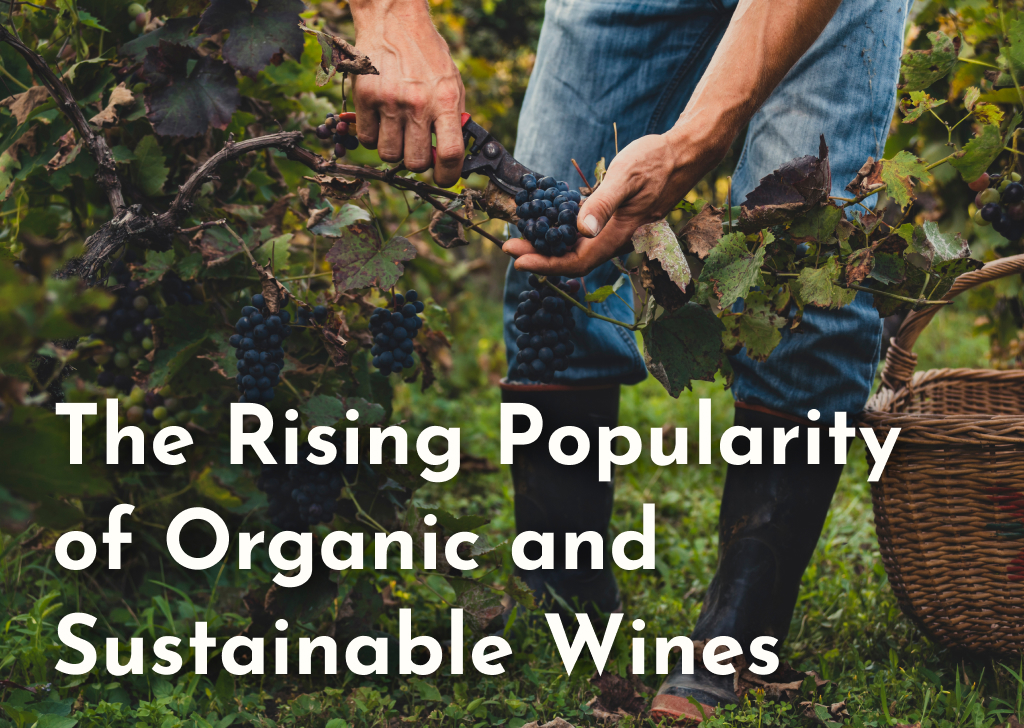In recent years, the wine industry has seen a significant shift towards organic and sustainable practices. What was once a niche market, often overshadowed by conventional wine production, has now gained substantial traction among both consumers and producers. The rising popularity of organic and sustainable wines is not just a trend; it’s a movement that reflects a broader commitment to environmental stewardship, health-conscious living, and quality craftsmanship.
Understanding Organic and Sustainable Wines
Before diving into the reasons behind their growing popularity, it’s essential to understand what sets organic and sustainable wines apart from their conventional counterparts.
Organic Wines: Organic wine production involves using grapes grown without synthetic fertilizers, pesticides, herbicides, or genetically modified organisms (GMOs). In organic vineyards, natural alternatives like compost, green manure, and biological pest control are employed to maintain the health of the vines. Additionally, organic wines are made without artificial preservatives or additives during the winemaking process, meaning what you are tasting is as close to the grape’s natural essence as possible.
Sustainable Wines: While organic practices focus on what happens in the vineyard, sustainable winemaking takes a broader approach. Sustainable viticulture considers the entire ecosystem, including water management, energy efficiency, waste reduction, and social responsibility. Sustainable wineries strive to minimize their environmental footprint and promote biodiversity, often incorporating organic practices but with a greater emphasis on long-term ecological balance.
The Factors Driving Popularity
The rise in popularity of organic and sustainable wines can be attributed to several key factors:
1. Consumer Awareness and Demand
Consumers are more informed than ever about what goes into the products they purchase. The rise in environmental and health consciousness has led many wine drinkers to seek out bottles that reflect their values. Organic wines, free from synthetic chemicals, are perceived as a healthier choice, while sustainable wines appeal to those who want to support eco-friendly practices.
2. Environmental and Social Responsibility
Rising temperatures, unpredictable weather patterns, and water scarcity are challenges that grape growers face worldwide. In response, many winemakers are adopting sustainable practices to mitigate their environmental impact and ensure the long-term viability of their vineyards.
Sustainability in winemaking also extends to social responsibility. Many sustainable wineries prioritize fair labor practices, community engagement, and supporting local economies. This holistic approach resonates with consumers who are looking to support companies that care about more than just profit.
3. Quality and Craftsmanship
Organic and sustainable practices have been adopted by many of the most prestigious wine and Champagne producers in the world. Winemakers who embrace these practices are deeply committed to their craft, focusing on soil health and natural processes that enhance the flavor and complexity of the wine. As a result, organic and sustainable wines have gained universal recognition for their quality and authenticity.
The Benefits of Organic and Sustainable Wines
The shift towards organic and sustainable wines offers numerous benefits for consumers, the environment, and the wine industry as a whole.
1. Environmental Impact
Organic and sustainable winemaking practices protect the environment by avoiding synthetic chemicals and reducing the overall carbon footprint of wine production. These practices promote biodiversity, protect water resources, and help combat climate change by sequestering carbon in the soil. In addition, organic and sustainable vineyards often serve as habitats for various plant and animal species, contributing to the preservation of local ecosystems. These practices also help to combat climate change by sequestering carbon in the soil and reducing greenhouse gas emissions.
2. Health Benefits
For consumers, one of the most compelling reasons to choose organic wine is the potential health benefits. Organic wines are made without synthetic pesticides, herbicides, or chemical additives, which means they are free from residues that can harm human health. Additionally, organic wines are often lower in sulfites, which can cause allergic reactions in some people. Sustainable wines also prioritize consumers’ and vineyard workers’ health and safety. By minimizing harmful chemicals, sustainable vineyards reduce the risk of exposure to toxic substances.
3. Supporting Ethical Practices
Choosing organic and sustainable wines is also a way to support ethical practices within the wine industry. Sustainable wineries often prioritize fair labor practices, ensuring workers are treated with dignity and respect. Many sustainable wineries are family-owned and operated, meaning your purchase directly supports small businesses and local communities.
The Future of Organic and Sustainable Wines
As consumer demand for organic and sustainable wines continues to grow, the wine industry will likely see even greater adoption of these practices. Winemakers worldwide recognize the importance of environmental stewardship and are increasingly incorporating organic and sustainable methods into their production processes.
Looking ahead, we can expect to see more innovation in sustainable winemaking, from using renewable energy to advancements in water conservation and waste management. As the industry evolves, so too will the quality and diversity of organic and sustainable wines available to consumers.
The rising popularity of organic and sustainable wines is a positive development for both the wine industry and the environment. By choosing these wines, consumers can enjoy high-quality, flavorful products while supporting practices that protect our planet and promote social responsibility.
